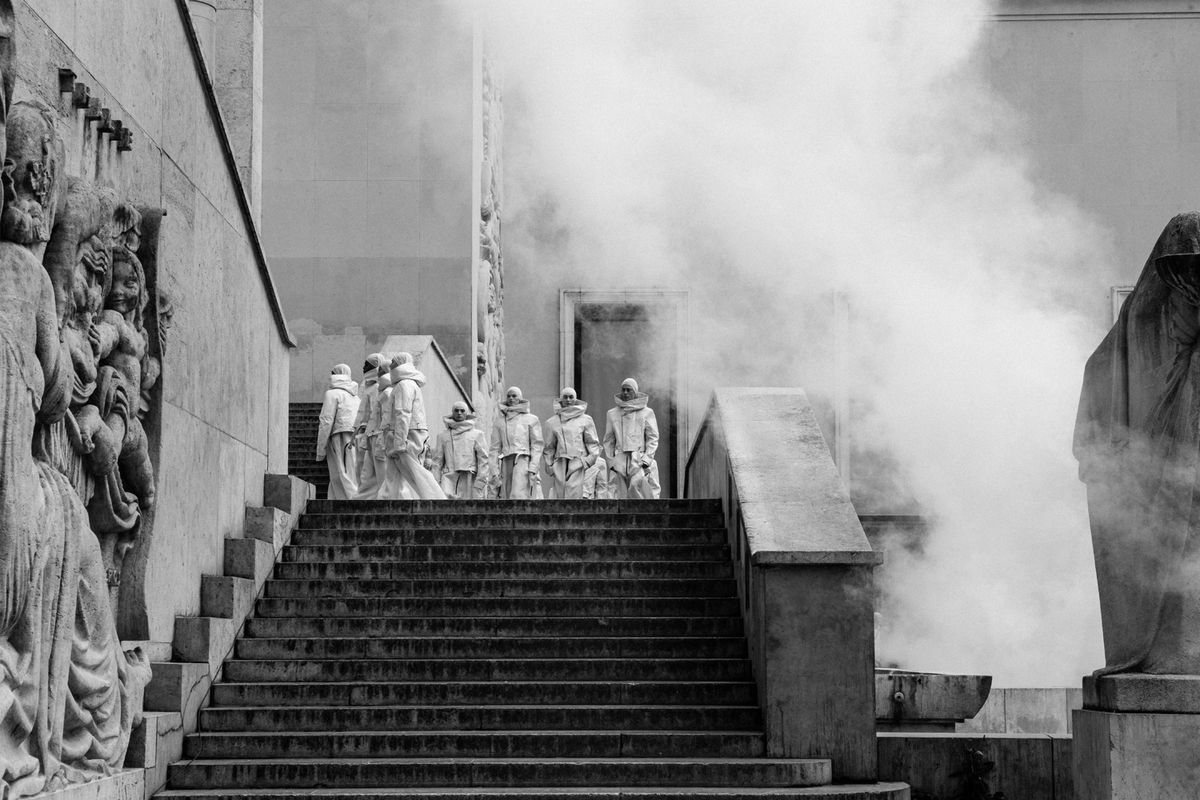World
China’s new world order: What Xi’s vision would mean for human rights, security

As Beijing’s authoritarian leadership grows increasingly bold in challenging the U.S.-led international order, Chinese leader Xi Jinping has called on developing countries to help create a “more balanced and effective” global governance system.
“International rules should be made and observed by all countries … not dictated by those with more muscles,” Mr. Xi told a conference of hundreds of officials, foreign dignitaries, and scholars gathered in Beijing last Friday.
Why We Wrote This
China’s road map for a new, multipolar world order raises questions of fairness, cooperation, and good governance.
China, which has the world’s second-largest economy and a rapidly growing military, is the best country to lead the reform, Mr. Xi asserted.
China’s long-range goal is a system, with the rights of sovereign states at the center, that better comports with Beijing’s economic interests and national security priorities. While welcomed by some countries, Mr. Xi’s blueprint also faces pushback from a world that, on the whole, remains wary of China’s rise. Some experts warn that China’s emphasis on state sovereignty could undercut efforts to protect human rights and settle international disputes.
“What we are talking about really is not China’s vision for how the world should work better; it’s a vision for China at the center of the world,” says Nadège Rolland, from the National Bureau of Asian Research.
Chinese leader Xi Jinping is pushing forward what he casts as an ambitious blueprint for reshaping the world order, urging developing countries to join Beijing in leading an overhaul of the international system.
Over the past year, Beijing’s authoritarian leadership has grown increasingly bold in challenging the U.S.-led, post-World War II international order and the liberal values that underpin it. Depicting the United States and its allies as defending an unfair and exclusive status quo, it asserts that the Chinese Communist Party has the vision to remake the world system, with China at the center.
In his latest pitch, Mr. Xi called on the developing nations of Asia, Africa, and Latin America to rally around China to become the “construction team” of a new, multipolar order.
Why We Wrote This
China’s road map for a new, multipolar world order raises questions of fairness, cooperation, and good governance.
“We should actively participate in reforming and developing the global governance system” to make it “more balanced and effective,” Mr. Xi told a conference of hundreds of foreign dignitaries, Chinese officials, and scholars gathered Friday in Beijing’s imposing Great Hall of the People. “International rules should be made and observed by all countries … not dictated by those with more muscles.”
Without naming the U.S. or Europe, Mr. Xi criticized what he called “bloc confrontation, creating small circles, and forcing others to pick sides” – references to Washington’s network of security alliances, which China opposes. As an alternative model, he upheld his own plan to create “a community with a shared future for mankind,” first announced in 2013. Since then, China has expanded its international influence through a series of sweeping, global development programs, including the infrastructure-focused Belt and Road Initiative (BRI).
China’s long-range goal is a system, with the rights of sovereign states at the center, that better comports with Beijing’s economic interests, authoritarian political values, and national security priorities. Yet while welcomed by some countries, Mr. Xi’s blueprint also faces pushback from a world that, on the whole, remains wary of China’s rise and intentions, public opinion polls show.
“What we are talking about really is not China’s vision for how the world should work better; it’s a vision for China at the center of the world,” says Nadège Rolland, distinguished fellow in China Studies at the National Bureau of Asian Research. “All the global initiatives are really about supporting China” and propelling its rise.
Spotty leadership record
Under Mr. Xi, China has invested and loaned an estimated $1 trillion throughout the Global South, mainly via the BRI but also via the Global Development Initiative (started in 2021), the Global Security Initiative (2022), and the Global Civilization Initiative (2023). These four programs now involve about 150 countries, in varying capacities.
China, which has the world’s second-largest economy and a rapidly growing military, is the best country to lead the charge for global governance reform, Mr. Xi asserted Friday. “Among the world’s major countries, China has the best track record with respect to peace and security,” he said. “Every increase of China’s strength is an increase of the prospects of world peace.”
Mr. Xi announced that China will deepen ties with the Global South by creating a Global South research center and offering 1,000 scholarships and 100,000 training opportunities over the next five years. China will seek more free-trade arrangements with developing countries, as China’s imports from the Global South are expected to exceed $8 trillion between now and 2030.
“China has answered the call of the times,” Mr. Xi told the audience from a podium decked with roses.
Yet the appeal of China’s overseas programs has been mixed.
While the BRI and development initiatives have helped meet massive infrastructure needs and advanced connectivity in poorer countries, some have generated criticism for worsening debt burdens and environmental pollution, and lax labor protections.
Also controversial are China’s efforts to promote an international system in which each state defines human rights as it sees fit. This undermines the United Nations’ concept of universal human rights, as well as the U.N.’s “responsibility to protect,” which justifies outside intervention in the case of mass atrocities and rights abuses.
“China emphasizes development and security but not the human rights pillar of the U.N.,” says Rosemary Foot, author of “China, the UN, and Human Protection: Beliefs, Power, Image.”
For example, in September, China released a white paper in which it attacked “the exclusive rules of bloc politics, the notion of might makes right, and the ‘universal values’ defined by a handful of Western countries.” Yet Dr. Foot calls this “a big distortion,” noting that a Chinese representative was involved at the creation of the U.N.’s Universal Declaration on Human Rights, and that China has signed a number of core human rights treaties.
Navigating conflict
On the topic of security, China’s stress on sovereign states also raises questions about how to handle disputes.
“If a state breaches an international treaty … China emphasizes dialogue – which is great but it doesn’t deal with the hard questions,” says Dr. Foot, professor and senior research fellow in the Department of Politics and International Relations at the University of Oxford. China’s decision not to condemn Russia’s 2022 invasion of Ukraine, while advocating talks, illustrates the limits to Beijing’s approach, she says.
Indeed, as Mr. Xi pledged that China would remain peaceful and never seek hegemony, tensions simmered closer to home over China’s territorial disputes with India, the Philippines, and other Asian neighbors, leading some conference participants to appeal for restraint by Beijing.
After the morning meeting, Rommel Banlaoi, president of the Philippine Society for International Security Studies, told a government-organized forum that “peaceful coexistence is all the more relevant in the context of Philippines-China relations.” The escalation of tensions between Chinese and Filipino forces in the South China Sea is “regrettable,” he added.
“It’s imperative for China and the Philippines to explore ways to meet halfway … to avoid violent conflict at sea,” he said at the Diaoyutai State Guesthouse in Beijing.
Friday’s conference – including Mr. Xi’s speech and the subsequent expert panels – was held to celebrate the 70th anniversary of the “five principles of peaceful coexistence,” a concept adopted by India, China, and other countries. The broad guidelines for relations between nations emphasize state sovereignty, nonaggression, and noninterference in each other’s internal affairs, and were later adopted by the nonaligned movement.
At the same afternoon forum, Indian scholar Avijit Banerjee, a professor of Chinese language at Visva-Bharati University, also raised concern over territorial disputes in Asia, including the border conflict between India and China that has led to deadly clashes in recent years. “All disputes should be settled peacefully, without the use of force,” he said.
Need for cooperation
Ultimately, experts stress, reforming global governance will require greater cooperation between China, the U.S., and other major powers, as well as from smaller countries.
“China is trying to showcase some more ambitious goals on global governance,” says Cui Hongjian, professor at Academy of Regional and Global Governance at Beijing Foreign Studies University and a former Chinese diplomat, who attended Mr. Xi’s speech. But overcoming intense mistrust and competition between the U.S. and China is “a very, very important precondition” for reform at the U.N., he adds.
Both countries consider themselves “exceptional,” and as a result “it’s going to be difficult within one system to put these two countries together and have them cohabit,” says Susan Thornton, a retired senior U.S. diplomat and senior fellow at the Yale Law School Paul Tsai China Center. “But,” she says, “we don’t have a choice.”
For some time, she predicts, the U.S. is likely to remain the de facto leader of the international system, given what she described as China’s reluctance to dive into resolving crises.
“We’ve worked really hard … to get China to answer the fire alarm in the past on some issues and [have] not gotten a lot of response,“ she says. “China tends to not want to stick its neck out and get involved in mediating disputes that are very thorny and risky,” she says. “I don’t think China’s ready to be a leader of the international system.”











